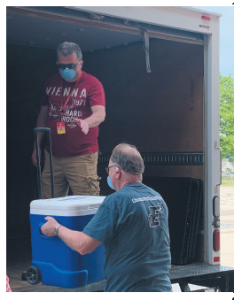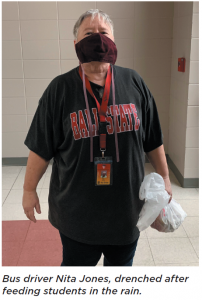E3: Extraordinary Essential Employee
This article (written by Kelley Kitchen) originally appeared in the September 2020 School Business Affairs magazine and is reprinted with permission of the Association of School Business Officials International (ASBO).
In mid-March, educators were anxiously awaiting spring break and planning for the year-end celebrations; Goshen Community Schools in Indiana was no different. All of that changed on Friday, March 13, when we heard words that we thought were relegated to history books: “pandemic,” “quarantine,” and “epidemic.” New phrases such as “self-isolate” and “social distancing” also emerged and have become part of our everyday vocabulary. But as school leaders, we knew that whatever apprehension, challenges, and fear existed, kids needed to continue learning.
The decision to close Goshen Community Schools was made on March 15. Immediately, the administration and staff brainstormed to develop and implement solutions to educate, feed, and meet the needs of all K–12 students. Decision making on and the delivery of student services ran at lightning speed. For example, a mere three days after announcing our closure, nearly 7,300 meals were prepared, packaged, and delivered to Goshen neighborhoods by bus.
Certainly, every school district employee across the country is essential, regardless of the COVID-19 pandemic. However, the crisis provided a new dimension to the definition of “essential employee”: those whose work to continue and enhance instruction must be completed on-site. These employee groups included school nutrition, maintenance, custodial services, transportation, finance, human resources, and technology. Although each group had specific responsibilities, they were also brought together to perform tasks outside their wheelhouse, including packing and delivering lunches. By the end of May, more than 177,000 meals had been served and in June that number surpassed 200,000.
The simple reason that solutions and implementation could be delivered so quickly was that the groundwork had already been laid. Within the operations team, bimonthly meetings were already being conducted before COVID-19. In those meetings, strategic plans were developed, a book study on The Speed of Trust was ongoing, and the implementation of peer reviews on facilities and departments occurred monthly. The teamwork to establish a framework to address needs and solve issues within the school district led to the effective and speedy implementation of solutions to support student instruction.
Honoring the E3
The new challenge became to maintain motivation and enthusiasm within these employee groups who reported to work on-site daily. Thus, the E3: Extraordinary Essential Employee campaign was born. Simply put, it was and continues to be an attitude of gratitude from the Goshen Community Schools administration and board as well as the community.
• Handwritten thank-you notes from administrators were distributed to each essential employee along with a T-shirt sporting the RedHawk and E3 logos.
• A drive-through coffee hour at our local Cabin Coffee as part of Teacher Appreciation Week was offered to all teachers and staff members as a way to say thank you.
• Central office staff periodically delivered doughnuts and lunch to those working onsite.
• Local businesses partnered with the district to provide gift cards for weekly drawings.
With great employees doing what they always do, Goshen Community Schools continues to inspire innovation, empower potential, and enrich our world.


Kelley Kitchen is the executive director of finance for Goshen Community Schools in Goshen, Indiana.
